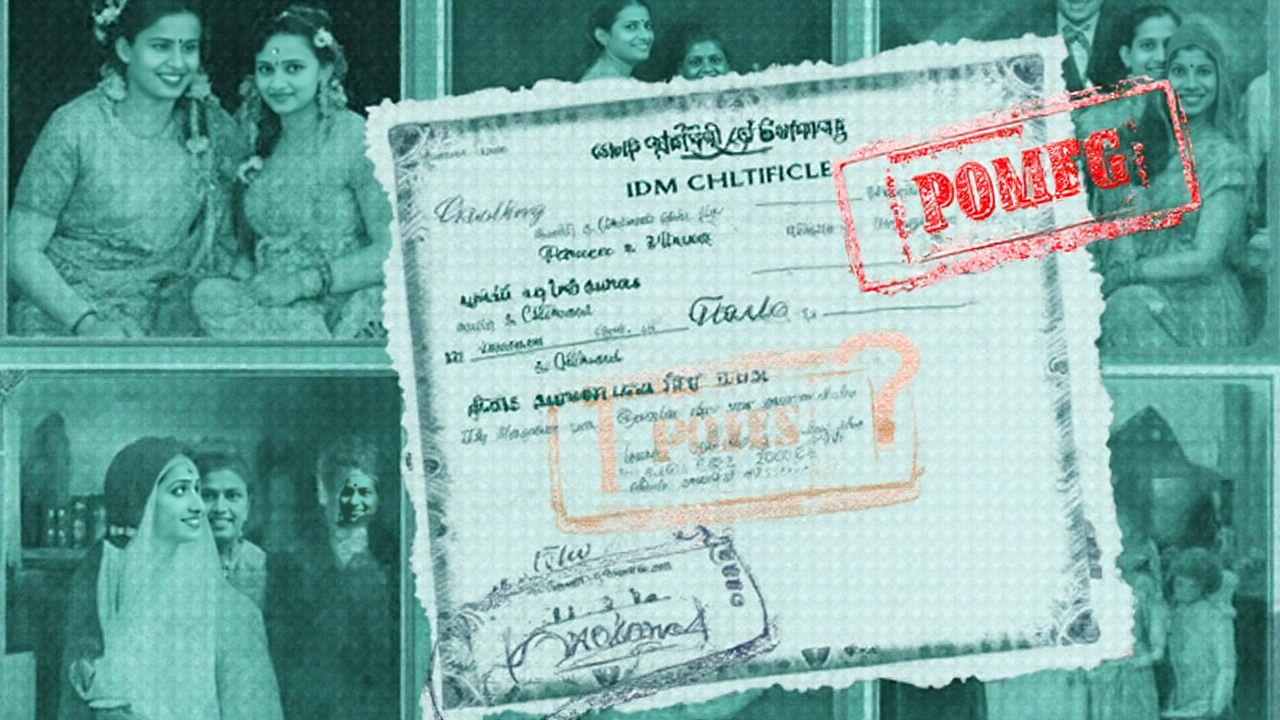Love doesn’t start with paperwork. But in India, when it comes to marriage, that paperwork can make or break more than people realise. Plenty of couples, especially in small towns, skip registering their marriage altogether. Relatives, rituals, and years go by—nobody gives it a second thought. But is a marriage still legal without registration? Or can skipping those forms mess up property, children’s rights, or even your safety tomorrow? The answer is more surprising—and complicated—than it seems.
How Indian Law Defines Marriage: Registration vs. Ritual
Walk through any old Indian neighbourhood and you’ll probably see wedding processions but hardly any queues outside the marriage registrar’s office. That’s because India sets marriage apart from, say, buying or selling a house. Legally, a marriage is created through rituals: the saat phere, nikkah, church vows, or any ceremony your community follows. The registration? That’s a lot newer, and, for most people, totally optional. Not fictional—section 8 of the Hindu Marriage Act, 1955, just says states “may” make rules for registration. There’s no national law that says your wedding is invalid if it isn’t registered. Even the Special Marriage Act, 1954—used for interfaith or civil marriages—requires registration as part of the ceremony but doesn’t cancel traditional marriages that skip the paperwork.
Think of it like this: the law recognizes a marriage by looking for these things—did both people agree? Were local rituals followed? Were both of legal age and single? As long as these basics are met, courts have upheld marriages even when couples registered everything decades late, or never at all. The Supreme Court in Seema vs Ashwani Kumar (2006) nudged states to push for registrations but didn’t make them compulsory. So, skipping registration doesn’t automatically erase your marriage or your status as husband and wife in the eyes of the law.
Why Do People Register Marriages? Unregistered Vs Registered Pros and Cons
If the law isn’t strict about registration, why do people bother at all? Here’s where modern problems start sneaking in. In legal battles—property fights, child custody, inheritance rows—a registered marriage certificate becomes your shield. It’s quick proof. No need to run after witnesses or find old wedding photos. Banks, insurance companies, and foreign embassies want the certificate, not your WhatsApp wedding invites. Even my buddy who wanted to take his new wife Maxine (not to be confused with Max, my dog) abroad got tangled for months because they only had wedding cards, not registration papers. A lot of government forms—passport, Aadhaar, even some school admissions—now ask for that little certificate.
Yet, despite all this, millions of Indians remain unregistered, especially in rural pockets. Why? Sometimes, families don’t know it’s useful. Sometimes, they worry about social stigma if the marriage faces technical objections like caste or religion. Others just want to dodge government offices thinking “who needs more bureaucracy?” The risk? In fraud cases, second marriages, or disputes, not having a registration drags things out. If your spouse vanishes or files a false case, you’ll be left scrambling for proof. Domestic violence laws, maintenance claims, and divorce proceedings all become trickier without a certificate. Courts usually accept other proof, but it’s slow, costly, and never guaranteed.
Let’s break that down in this table:
| Aspect | Registered Marriage | Unregistered Marriage |
|---|---|---|
| Legal Validity | Easy to prove | Still valid if rituals done |
| Proof in Court | Marriage certificate accepted | Need witnesses, photos |
| Divorce Process | Smoother, quicker | Can be messier |
| Property Rights | Lesser disputes | More likely to face challenges |
| Spouse Visa | Mostly required | Rarely accepted |
Practical? Yes. Compulsory? No. But the convenience is hard to argue with now, especially with digital records getting popular.

Legal Proof—How Do Courts Decide If You’re Married?
For anyone worrying—“Am I really married if I don’t have a certificate?”—this is how it plays out in Indian courts. Judges look at the ceremony itself first. If you’re Hindu, did you take the saat phere? In Muslim law, was there an offer, acceptance, and witnesses? For Christians, was the marriage held by an authorized priest? Once you clear this, the law presumes you’re married. Registration is a bonus, not a must. But if things go wrong—say you’re fighting over property, alimony, or custody—the headache of proving a marriage without registration is huge. The burden lands on you to produce invitation cards, photographs, and—here’s the catch—real witnesses. Try getting relatives to testify in a hostile case. Everyone’s memory suddenly becomes very cloudy.
One famous 2022 case from Delhi High Court is worth knowing: A woman, in a nasty divorce, claimed her marriage was never legal as it wasn’t registered. But her husband showed receipts from the banquet hall, WhatsApp messages, and photos with the priest and guests. The court said registration isn’t compulsory, and accepted these proofs. Still, it took months of stress and heavy bills. In contract marriages for NRI grooms, courts have also protected women even when the marriage stayed totally off the government’s books. But no certificate means your evidence must be rock-solid. The whole migraine is avoidable if the marriage gets registered in the first place.
Key Facts: What Indian Laws Say About Registration
If you love reading fine print, here’s a quick cheat sheet on Indian marriage registration laws:
- The Hindu Marriage Act, 1955: Allows states to make rules for registration, but marriage remains valid without it if proper rituals performed.
- The Special Marriage Act, 1954: Registration is part of the process, but this usually applies if you marry outside your religion or want a civil ceremony.
- Muslim Personal Law: Marriage can be oral or written with witnesses—registration not required, but khutba (sermon) and agreement must be met.
- Christian Marriage Act, 1872: Church weddings need to be recorded in a marriage register, but registration with local authorities isn’t a must unless demanded for civic formality.
States like Maharashtra, Gujarat, and Karnataka now push for compulsory registration. But so far, at the national level, failing to register won’t scrap your marriage. The Supreme Court’s take: registration is “desirable for public notice and proof” but not mandatory. Parliament has debated this but hasn’t made it a blanket rule yet.
There’s one twist: Your state might have stricter local rules. For example, Uttarakhand made registration compulsory in 2010 and levies small fines for delays. Also, if you need a foreign spouse visa, embassies will usually accept nothing but an official marriage certificate. No certificate, no international travel—no matter how big the wedding was back home.

Smart Tips: How To Register Your Marriage (And Why You Should)
If you want to avoid grief later, registration is a good investment. Even if your wedding was years ago, it’s never too late. Here’s how you can do it:
- Visit your local Sub-Registrar office (usually where the bride or groom lives).
- Carry your wedding photos, invitation card, identity/address proofs, and two joint passport-sized photos.
- Get at least two witnesses (often family or friends, with ID proof) to sign.
- Fill out the application form (most cities have these online now).
- Pay the small registration fee (usually between ₹100–₹500 depending on the state).
- Wait for the registrar to verify and issue your certificate, usually in 7–30 days depending on the backlog.
Here’s a tip: If your spelling doesn’t match across documents, fix it now. Embassies and banks are picky about mismatches. Another: Don’t lose your digital certificate—save the PDF and email a backup to yourself. If you live abroad, Indian embassies can register your marriage too, but they might need even more proof.
If you’re remarried after divorce, always bring your decree of divorce. And if you have a pet like my Max, no—there’s no legal requirement to register them as witnesses, though it’s a running joke among pet lovers in registration lines.
Too busy to stand in line? Many metros like Mumbai and Delhi now offer online pre-registration and appointment slots, making things less painful. Some states also penalise marriages not registered within 30 or 60 days but usually with symbolic fines, not jail time.
Some quick facts to summarize:
- Marriages are legal if rituals are followed, even if not registered.
- Unregistered marriages make legal disputes messier.
- Court battles are tougher to win without quick proof.
- Many states encourage registration for your protection.
So, while Bollywood might thrive on dramatic wedding scenes, the smart move is to finish the happily ever after with a paper trail.


